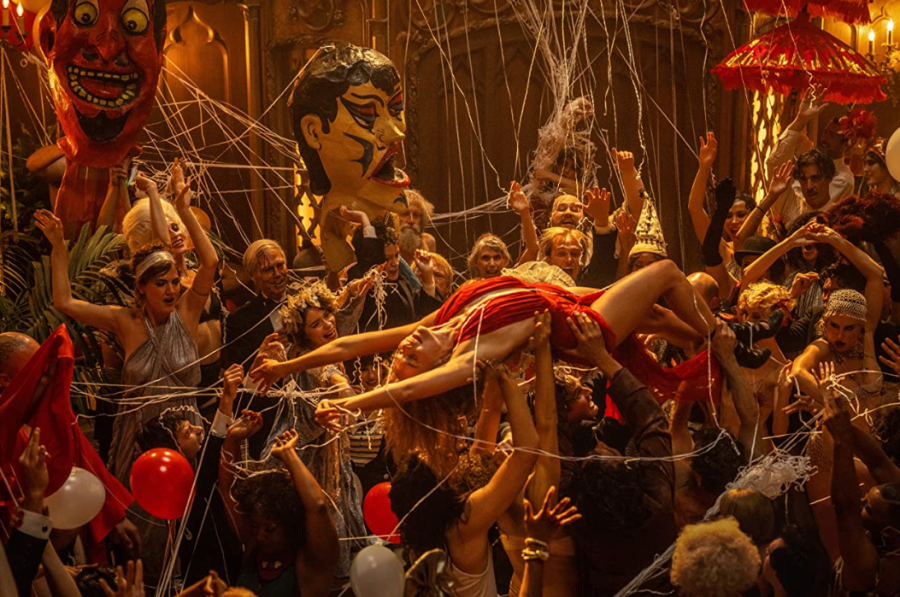Babylon is a mighty, grimy Hollywood fable lost in its own excess
Margot Robbie stars in Damien Chazelle’s latest Drama, following the rise and fall of ambitious actors in 1920’s Hollywood.
“A love letter to cinema” – that’s the go-to phrase for critics when describing films that chronicle the inner workings of Hollywood – particularly the silent (pre-sound) and pre-code MPAA morality code (which was put in place to curb violence and other ‘amoral’ themes at the movies) eras of film.
Glamorous, nostalgic films exploring the early days of cinema are a particular favorite of voting bodies – the term ‘Oscar bait’ is none-too-kindly tossed around when discussing films that fit the mold.
The latest entry in the ‘cinematic encapsulation of Hollywood’ is “Babylon,” “La La Land” director Damien Chazelle’s mammoth, three-hour epic starring Margot Robbie, Diego Calva, and Brad Pitt. Though Calva and Robbie performances are all-consuming, and the film boasts a number of memorable sequences, “Babylon” still ends up a bloated, predictable narrative driven by indulgent spectacle.
A cautionary tale/fable told from the alternating viewpoints of three Hollywood stars, “Babylon” follows brash, ambitious Nellie LaRoy (Robbie), the wide-eyed Manny Torres (Calva) and silent film star Jack Conrad (Pitt) as they struggle to find fame and fortune in an ever-changing, ever-seedy Hollywood. As their careers grow and branch in drastically different directions, the trio intermittently cross paths, discovering along the way the harsh realities of a life in the budding film industry.
“Babylon” is a visual and technical marvel, filled to the brim with dazzling costumes, massive setpieces, and sprawling landscapes that dutifully create the picturesque version of Hollywood that has so thoroughly enraptured our trio of heroes. Chazelle’s artistry and competence as a director is never in question,from the signature whip-shots to the jazz-heavy score (courtesy of frequent collaborator Justin Hurwitz), his talent for creating vibrant tableaus is never in question.
Where the film struggles is in efficiency of storytelling and depth of character. While it’s refreshing to see a film about Old Hollywood that isn’t all glossy nostalgic fluff, “Babylon” doesn’t seem to have much to say. Admittedly, it’s a much-needed change of pace that a film set in the early days of Hollywood doesn’t simply reminisce about the “good old days,” but at the same time, “Babylon” doesn’t seem to be sure of what exactly about the system it’s critiquing.
Certainly, the first thought that comes to mind is the industry’s treatment of marginalized people – particularly women and people of color. Calva’s Manny, as well as Jovan Adepo’s Sidney Palmer (a trumpet player and eventual film star) and Li Jun Li’s Lady Fay Zhu (a seductive cabaret star) all endure slurs and discrimination at the hands of the mostly white, male Hollywood elite.
But even as they’re subjected to cruelties and dehumanization that stars like Nellie and Jack Conrad aren’t, the film still can’t help but cling to a rosy-eyed optimism of stardom. Though they may suffer, the fable eventually shows us that as long as they keep working and wait long enough, their patience and suffering will be rewarded with success. Both Manny and Sidney find fame and fortune through hard work – and though Manny does eventually lose everything, it’s because of Nellie’s bumbling addictions, not the unflinching, ever-moving industry machine.
The most significant victim of the industry (at least on paper) is Brad Pitt’s Jack Conrad – a silent film star who struggles to reconcile with his ever-growing irrelevance as Hollywood barrels towards a film landscape dominated by sound.
Yet, even as the film highlights how Hollywood discards stars like old playthings once they’re no longer of interest, the sentiment isn’t allowed to linger. In the same breath that Elinor St John (Jean Smart) explains to Conrad how irrelevant he is, she then simply reassures him by turning around and launching into a rousing speech about how a film star can never die.
As much as “Babylon” is refreshing in its ability to recognize the glaring systemic flaws of Hollywood as an industry, the film still can’t help (like its protagonists) to continue to cling to the magic of cinema with a reverence that undercuts the story it’s trying to tell. Certainly, there’s a complicated duality to Nellie, Manny, and Jack’s dilemma. They understand the cutthroat nature of the industry, but press on because of their love of the art.
But when push comes to shove, all of the misfortune that befalls our heroes (most commonly Nellie) isn’t a systemic issue, but instead a problem of her own creation, turning what could’ve been a searing fable into a toothless exercise decadence and misery. The film’s approach towards visualizing the aforementioned misery is also troubling. On numerous occasions, “Babylon” uses extras with disabilities or other physical deformities to demonstrate the griminess of Hollywood parties.
Though I have no doubt that old Hollywood parties were wild and seedy, the choice to use actors with disabilities as veritable human props to prove this point feels misguided at best and ableist at worst. Beyond the troubling use of actors with disabilities, though, “Babylon’s” party sequences are some of its most effective – the cacophonous, sordid affairs are filled with every bodily fluid and exotic animal imaginable.
“Babylon’s” commitment to grime and filth is commendable, especially from a production design standpoint, and the film’s dedication to creating an immersive world continues into its references. You could fill a novel with the films “Babylon” references – whether directly in re-created on-set scenes, or merely verbally referenced/alluded to, the film’s infatuation with and understanding of silent and pre-code films is one of its most impressive qualities.
When it comes to the cast, “Babylon” is a mixed bag. Margot Robbie is (as ever) a whirlwind of energy who draws focus whenever she’s on-screen, though admittedly this is an accent and character archetype she’s certainly shown us before. Brad Pitt is serviceable as a broadly egotistical fading star, but of the main trio, it’s unquestionably Diego Calva as Manny who steals the show.
Both optimistic and appropriately cynical, Manny is a compelling, fully realized leading man – a refreshingly clear head in a sea full of egomaniacal addicts. The film’s final sequence, a dazzling montage of cinema history, is made stellar by Calva’s silent but utterly mesmerizing revelations. Though the strength of Calva’s performance and the sweeping majesty of the final montage are undeniably stirring, “Babylon’s” toothless “criticism” of Hollywood and overblown presentation of a bare-bones story ultimately outweigh its admirable intentions.















